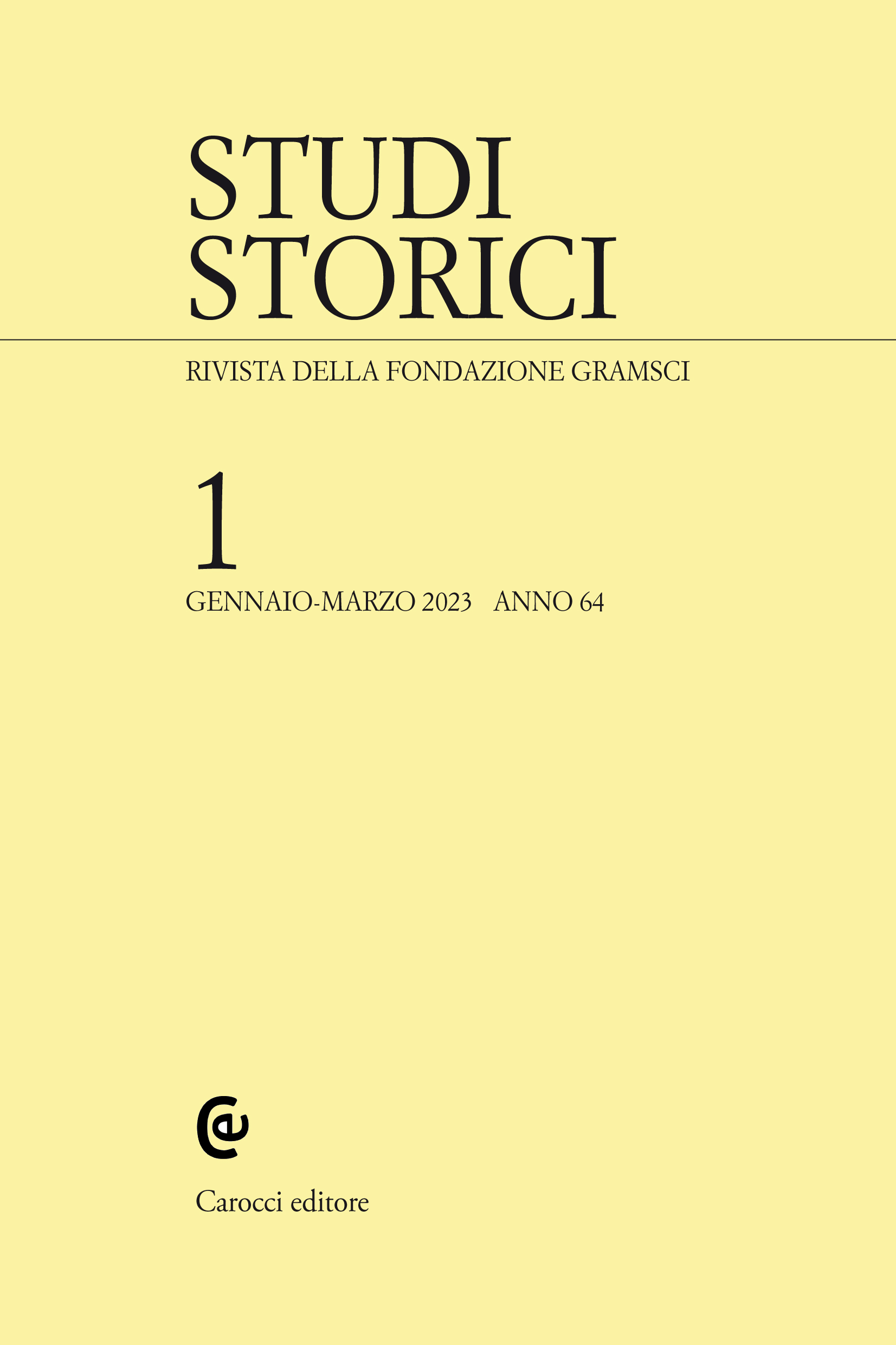
gennaio - marzo 2023 anno 64
Sommario e abstract degli articoli
Andrea Gamberini, pp. 5-20
Il testamento di Bernabò Visconti. Le ultime volontà di un signore del Trecento, fra pubblico e privato
The Will of Bernabò Visconti. The Testament of a 14th-Century Lord, between Public and Private
The discovery of Bernabò Visconti’s last will is not news to be confined among the erudite notices cherished by antiquarian enthusiasts. It concerns, in fact, of an extraordinary historical source, useful not only for reconstructing the geography of Visconti power, and the circle of lordly officials, but also the institutional role assigned to Bernabò’s kinship. On top of that, no less telling are the formal aspects of the document, which has more than one borrowing from the lord’s decrees and which reveals Bernabò’s own mixture of public and private.
Keywords: Bernabò Visconti, State building process, Medieval Lombardy, Testaments.
Parole chiave: Bernabò Visconti, Processi di costruzione statale, Lombardia medievale, Testamenti.
Elena Bonora, pp. 21-52
Quale Controriforma? Roma e l’Europa multiconfessionale
Between the Himalayas and the North Pole. Rethinking Geographical Explorations in Extreme Environments
A vast international historiography has recently highlighted the existence of an early-modern multidenominational Europe, which was the result of the religious pluralism triggered by the Protestant Reformation and the ‘religious peaces’. This Europe, marked by shifting confessional topographies densely interwoven with each other, is quite different from the one that the theorists of Confessionalization and Social Disciplining have depicted. Nevertheless, many questions arise if we approach multidenominational Europe from the perspective of the Church of Rome: how did the Roman Curia act in this Europe, where ‘heresy’ was legalised and Catholicism had often become a minority? How did the Roman Church operate in contexts where religious conflicts were judicially settled by competing ecclesiastical and civil authorities belonging to different confessions? This article suggests new research directions to answer these questions and explore the European dimension of the Counter-Reformation.
Keywords: Counter-Reformation, Multidenominational Europe, Multiconfessionalism, Roman Curia, Papal Diplomacy.
Parole chiave: Controriforma, Europa multiconfessionale, Multiconfessionalità, Curia romana, Diplomazia pontificia.
Ripensare il crollo dell'Unione Sovietica. Una svolta mancata verso la democrazia e il federalismo
Andrea Borelli, pp. 57-78
Gorbačëv, il Pcus e la democratizzazione dell’Unione Sovietica (1987-1991)
Gorbachev, the CPSU and the Democratization of the Soviet Union (1987-1991)
In the 1987, thanks to the Mikhail Gorbachev’s reforms, the Soviet Union began a democratization process in which various actors played a different role. The essay analyzes the role of the CPSU in specifically. How did the party respond to Gorbachev? How did the CPSU and the soviet democratization influence each other? The attempt is to overcome historiographic narratives according to which Gorbachev failed in his efforts to build a democracy because the party boycotted him. The essay suggests that the Soviet Communist Party executed quite faithfully the Gorbachev’s directions. In the 1991, the failure of Gorbachev should be read as the result of the interaction of his confusing political reforms, the internal climate created by glasnost’ and the deep crisis of Soviet economy.
Keywords: Gorbachev, USSR, Soviet Union, Democratization, Post-socialism.
Parole chiave: Gorbačëv, URSS, Unione Sovietica, Democratizzazione, Post-socialismo.
Carolina de Stefano, pp. 79-100
I vertici dell’Urss e della Repubblica sovietica russa di fronte all’esplosione della questione nazionale negli anni della perestrojka
The Leaders of the Ussr and the Russian Soviet Republic Grappling with the Explosion of the National Question during the Years of Perestroika
This article analyzes some of the main dilemmas and problems that the leadership of the USSR led by Mikhail Gorbachev faced when dealing with the explosion of the national question in the country during perestroika, and focuses on three interrelated issues: the need, against the backdrop of democratization and the political crisis of the Soviet system, to decentralize the Union Federation; the questioning of the existing hierarchy among the nationalities of the Union and at territorial levels; and the urgency of redefining the position and legal status of specific ethnic groups and minorities in the transition from an imperial- type entity to national states dominated by strong nationalist rhetoric and impulses. The research is based on recently declassified sources from the holdings of the Department of Letters of the CPSU Central Committee at the Russian State Archive of Contemporary History (RGANI), and documents from the holdings of the Committee on Nationalities of the Government of the RSFSR at the State Archive of the Russian Federation (GARF).
Keywords: Gorbachev, Nationalities, Nationalism, Soviet federation, Ethnic minorities
Parole chiave: Gorbačëv, Nazionalità, Nazionalismo, Federazione sovietica, Minoranze etniche.
Simona Merlo, pp. 101-122
«Senza l’Ucraina non ci sarà l’Unione». Il ruolo della dirigenza di Kyïv nel fallimento del progetto di riforma federale dell’Urss
“Without Ukraine, there Will Be no Union”. The Role of the Kyiv Leadership in the Failure of the Federal Reform Project of the USSR
The Ukrainian case is part of the broader debate on the role of the national factor and of ethnonationalism in the dissolution of the USSR. Its specificity is connected to the importance of this Republic for federal balances. The essay examines the role played by Ukraine in the negotiations promoted by Gorbachev to restore the USSR on a new basis, through a new treaty that would bind the republics that made up the Soviet Union in a federal relationship. “Without Ukraine, there will be no Union”: such was the opinion of both Yeltsin and Gorbachev, to which the latter would have added that “without the Union, there will be no Ukraine.” The Ukrainian contribution to the failure of Gorbachev’s project lay not so much in the independence referendum of 1 December 1991, but rather in the initially ambiguous and then adverse positions assumed by a part of the Ukrainian leadership in the negotiations, a behaviour that exhausted the negotiation process.
Keywords: Soviet Union, Ukraine, Ethnonationalism, Gorbachev.
Parole chiave: Unione Sovietica, Ucraina, Etnonazionalismo, Gorbačëv.
Simone Attilio Bellezza, pp. 123-142
The Chornobyl Factor: Eco-Nationalism as a Marker of the Ukrainian Nomenklatura’s Disaffection with Soviet Central Power
The Chornobyl Factor: Eco-Nationalism as a Marker of the Ukrainian Nomenklatura’s Disaffection with Soviet Central Power
Through analysis of documentation from the KGB archives and Ukrainian political movements, this essay will show how the accident at the Chornobyl atomic power plant marked a caesura in the political history of Soviet Ukraine. Highlighting the Soviet government’s inability to deal with the aftermath of the explosion, the tragedy led to mass dissent in the form of ecological movements, which strengthened the ranks of those who aspired to independence. Thus, the Ukrainian environmental movement influenced government decisions on the construction of new power plants, and its leader, following the Granite Revolution, was included in the last Ukrainian Soviet government.
Keywords: Ukraine, Chornobyl accident, Environmental movements, Soviet Union, Yuri Shcherbak.
Parole chiave: Ucraina, Čornobyl’, Movimenti ambientalisti, Unione Sovietica, Yuri Shcherbak.
Riccardo Mario Cucciolla, pp. 145-166
I democratici russi, la disunione sovietica e la questione federale, 1989-1991
Russian Democrats, the Soviet Disunion and the Federal Question 1989-1991
After 1989, in the USSR, a number of non-Communist figures identifying themselves as “democrats” gathered in parliamentary groups, parties, and civil society organizations representing the most diverse liberal, conservative, and populist demands. Although they had different agendas, they were united by the desire to dismantle the political monopoly of the CPSU. The Interregional Group and the Democratic Russia movement (DemRossiya) became the unifying landmarks, forming variable-geometry coalitions around the figure of Boris Yeltsin and taking divergent positions on the economic and social reforms. However, the main challenge that compromised the unity of the Russian democratic movement in 1991 was the federal question. The collapse of the Soviet Union and the Chechen crisis exacerbated the debates and formalized the first splits in the movement, distancing a part of Russian nationalism that broke with Yeltsin and moved closer to those national groups that claimed greater autonomy.
Keywords: USSR, Russian democrats, Perestroika, Chechnya, Federalism.
Parole chiave: Urss, Democratici russi, Perestrojka, Cecenia, Federalismo.
Ricerche
Viviana Mellone, pp. 167-198
Le relazioni franco-spagnole nei primi anni della Restaurazione (1815-1819). Una retrospettiva sull’egemonia francese nell’Europa del XIX secolo
Franco-Spanish Relations in the Early Years of the Restoration (1815-1819). A Retrospective on French Hegemony in Nineteenth-Century Europe
This article aims at investigating Franco-Spanish relations in the early years of the Restoration as the testing ground for the influential French role in managing political crises in Europe and the Mediterranean in the decades that followed. The article will start by focusing on marriage policies to ensure Bourbons would remain on both thrones, the first factor Louis XVIII paid attention to in strengthening the Franco-Spanish alliance. Then, the divergent French and Spanish policies concerning political criminals will be explored as a concrete field of experience in the French perspective: such policies made the French government conscious of the Spanish reactionary regime and stimulated French intervention in Spanish domestic policies. Lastly, French diplomatic mediation in the Spanish American colonial crisis will be analysed. The research draws upon the diplomatic correspondence at the Ministry of Foreign Affairs Archives at Paris-La Courneuve.
Keywords: Franco-Spanish relations, European post-Napoleonic order, Marriage policies, Spanish American colonial crisis, Security studies.
Parole chiave: Relazioni franco-spagnole, Ordine europeo post-napoleonico, Politiche matrimoniali, Crisi coloniale ispano-americana, Studi sulla sicurezza.
Chiara Dogliotti, pp. 199-233
Alla ricerca del nuovo soggetto rivoluzionario. Le Brigate Rosse napoletane tra movimentismo e criminalità
In Search of the New Revolutionary Subject. The Neapolitan Red Brigades between Movementism and Crime
The Neapolitan column of the Red Brigades presents a peculiar feature quite different from that of the other homologous articulations of the organization; this particularity is due to a number of factors: the conditioning of the context in which it operates; its belonging to the Movementist current of the organization; its late birth, in the twilight of the BR’s parabola characterized by new theoretical and strategic elaborations; and the influence of the criminologist Giovanni Senzani who saw criminals and marginalised people as the new protagonists in the Revolution, in place of a working class that had lost the centrality traditionally attributed to it by the Red Brigades. The focus on the environment of the lawless, the contiguity with criminality, and the relations, however tenuous and controversial, with the Camorra, transformed the Neapolitan organization into something other than the Brigatist column as conceived in the theoretical documents of the Red Brigades, resulting in a physiognomy unequivocally influenced by the context.
Keywords: Red Brigades, Camorra, Criminality, Terrorism, Napoli.
Parole chiave: Brigate rosse, Camorra, Criminalità, Terrorismo, Napoli.
Note critiche
Alessandro Pastore, pp. 235-243
Tra l’Himalaya e il Polo Nord. Ripensando le esplorazioni in ambienti estremi
Between the Himalayas and the North Pole. Rethinking Geographical Explorations in Extreme Environments
This article reflects on the book Rethinking Geographical Explorations in Extreme Environments, edited by Marco Armiero, Roberta Biasillo and Stefano Morosini, London, Routledge, 2023.t.
Keywords: Non-European mountaineering, Arctic explorations, Global history.
Parole chiave: Non-European mountaineering, Arctic explorations, Global history.
Sfoglia gli altri numeri dell’anno 64 / 2023
Elenco dei fascicoli pubblicati dal 2010
Seleziona fascicolo...
- anno 65 / 2024
- 1
- 2
- anno 64 / 2023
- 1
- 2
- 3
- 4
- anno 63 / 2022
- 1
- 2
- 3
- 4
- anno 62 / 2021
- 1
- 2
- 3
- 4
- anno 61 / 2020
- 1
- 2
- 3
- 4
- anno 60 / 2019
- 1
- 2
- 3
- 4
- anno 59 / 2018
- 1
- 2
- 3
- 4
- anno 58 / 2017
- 1
- 2
- 3
- 4
- anno 57 / 2016
- 1
- 2
- 3
- 4
- anno 56 / 2015
- 1
- 2
- 3
- 4
- anno 55 / 2014
- 1
- 2
- 3
- 4
- anno 54 / 2013
- 1
- 2
- 3
- 4
- anno 53 / 2012
- 1
- 2
- 3
- 4
- anno 52 / 2011
- 1
- 2
- 3
- 4
- anno 51 / 2010
- 1
- 2
- 3
- 4
